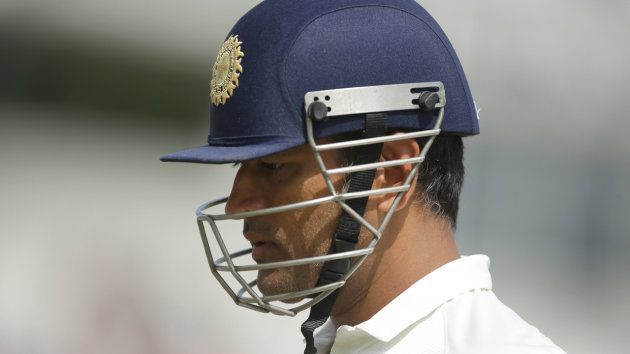Australia 350 for 6 (Maxwell 93, Marsh 89) beat Zimbabwe 152 (Masakadza 70, Smith 3-16) by 198 runs
Scorecard and ball-by-ball details
Scorecard and ball-by-ball details
A blistering 109-run stand in nine overs between Mitchell Marsh and Glenn Maxwell saw Australia rack up the highest ODI total at the Harare Sports Club and leave Zimbabwe in the dust in the tri-series opener. Both Marsh, promoted to No.3 in Michael Clarke's injury-enforced absence, and Maxwell recorded their highest scores in the format as Australia stacked on 147 runs in their last ten overs. Zimbabwe's best batsman, Hamilton Masakadza, managed less than half of that.
Australia's innings had a solid start and a flourishing finish as they first assessed the conditions and the opposition and then showed how they would react given the lack of any real threats. Aaron Finch and Brad Haddin, who was given the opening berth ahead of Phil Hughes, were circumspect upfront but found the boundary often in the first 15 overs with Zimbabwe's bowlers offering a mix of deliveries that spanned the spectrum of too short, too wide, too full and too far down the leg-side.
When Elton Chigumbura introduced himself in the 15th over, it seemed groundhog day was looming for the hosts. Fortune intervened to give them a breakthrough when Haddin went down the pitch to defend against Chigumbura but the ball dropped on the pitch, bounced behind him and removed the leg bail.
That was Zimbabwe's cue to enforce a squeeze, engineered by Prosper Utseya. Tight lines against a watchful Marsh resulted in just 23 runs coming from the next seven-and-a-half overs, during which Finch reached his half-century. In a bid to get a move on, Australia took the Powerplay at the start of the 29th over but found themselves similarly stuck. Zimbabwe gave away just 25 runs in the five-over period, got rid of Finch, and tightened their grip afterwards when Utseya held on to a catch at short third man to dismiss George Bailey.
Little did they know what lay on the other side of that wicket.
Maxwell allowed himself an 12-ball sighter before charging Utseya for the first of his three sixes. Australia's score peeped over 200 as the last 10 overs began and exploded to 281 by the time the last five overs had arrived.
Marsh and Maxwell put to use the six-hitting practice Australia had done the day before the match and tucked into Williams, Nyumbu and Panyangara, sometimes finding the boundary, other times going over it. Twenty runs came off a Nyumbu over, and 19 and 15 off two from Panyangara. Marsh went from 50 to 88 in 32 balls; Maxwell from 20 to 64 in 18 balls and both seemed destined for three figures.
But as Marsh was about to enter the nineties, he failed to clear long-on and was caught off a Chatara slower ball. Maxwell marched to 93 but then misjudged one and gave Chatara a second consolation wicket. But the damage had already been done and Zimbabwe could only hope for a respectable response.
For that, they needed a strong opening stand but their third combination in the last four matches could not deliver. Tino Mawoyo, who was brought into the XI, was trapped lbw by a Mitchell Starcdelivery that caught him in his crease as it angled in.
Sikandar Raza and Hamilton Masakadza showed fight with the highest stand of the Zimbabwe innings, 63 runs, with Masakadza the mainstay. Raza refused to take a run off Mitchell Johnson, playing out two successive maidens from him, but eased the pressure when Kane Richardson was brought on and he could hit with confidence through the off side. He once again threw away a start when he hit Lyon straight to backward square leg.
Masakadza held the innings together as Taylor, fresh from being dropped, pushed lazily at a Johnson delivery with a hint of extra bounce to be caught at slip, Chigumbura top-edged a short ball after being hit by Johnson and Sean Williams gifted a catch to cover. At 88 for 5 in the 23rd over, Zimbabwe were out of the contest, and besides Masakadza's 24th ODI fifty there were few positives for them.
Soft dismissals were the primary method of departure for Zimbabwe's batsman with partnerships lean and bowlers given a free pass to collect wickets. Chigumbura used one word to sum up Zimbabwe's performance. "Outplayed." It was actually much more than that because they undid themselves as much as they were undone by an Australian side that did not look like they had been without game time since January.
ESPN Sports Media Ltd.
ESPN Sports Media Ltd.








